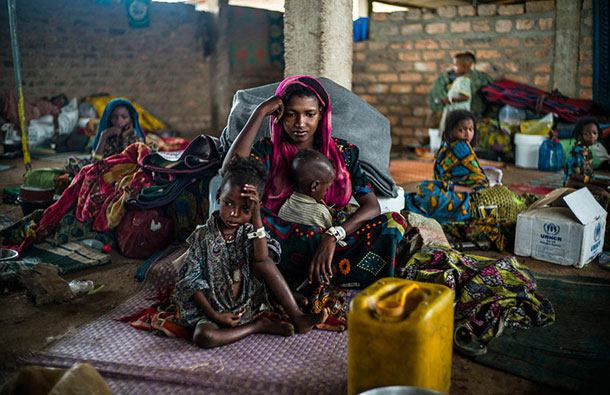

Central African Republic in Crisis
GENEVA – INTERNATIONAL NEWS – Starvation is a looming reality for many people in the Central African Republic. The call is out from the United Nations for immediate aid.
The heads of two United Nations humanitarian agencies today issued an urgent appeal as food shortages hit nearly 800,000 refugees in Africa, threatening to worsen already unacceptable levels of acute malnutrition, stunting and anaemia, particularly in children.
World Food Programme (WFP) Executive Director Ertharin Cousin and UN High Commissioner for Refugees António Guterres appealed during a meeting in Geneva for $186 million to allow WFP to restore full rations and another $39 million to enable UNHCR to provide nutrition support to malnourished and vulnerable refugees in Africa.
“The number of crises around the world is far outpacing the level of funding for humanitarian operations, and vulnerable refugees in critical operations are falling through the cracks,” said Mr. Guterres. “It is unacceptable in today’s world of plenty for refugees to face chronic hunger or that their children drop out of school to help families survive.”
Across Africa, 2.4 million refugees in some 200 sites in 22 countries depend on regular food aid from WFP. Currently, a third of those refugees have seen reductions in their rations, with refugees in Chad facing cuts as high as 60 per cent, according to a joint news release issued by the two agencies.
Supplies have been cut by at least 50 per cent for nearly 450,000 refugees in remote camps and other sites in the Central African Republic, Chad and South Sudan. Another 338,000 refugees in Liberia, Burkina Faso, Mozambique, Ghana, Mauritania and Uganda have seen their rations reduced by between five and 43 per cent.
n addition, a series of unexpected, temporary ration reductions has affected camps in several countries since early 2013 and into 2014, including in Uganda, Kenya, Ethiopia, Republic of Congo, Democratic Republic of Congo and Cameroon. Some cuts were also due to insecurity that affected deliveries.
“Many refugees in Africa depend on WFP food to stay alive and are now suffering because of a shortage of funding,” Ms. Cousin said. “So we are appealing to donor governments to help all refugees – half of whom are children – have enough food to be healthy and to build their own futures.”
A joint UNHCR-WFP report issued in conjunction with today’s meeting says that refugees are among the world’s most vulnerable people and warns that reductions in their minimum rations can have a devastating impact on already weakened populations.
Refugees hit by the food shortages are struggling to cope, posing a host of additional problems as they resort to what the report calls “negative coping strategies,” such as an increase in school dropouts as refugee children seek work to help provide food for their families; exploitation and abuse of women refugees who venture out of camps in search of work; and “survival sex” by women and girls trying to raise money to buy food.
Improving livelihood opportunities and food security is paramount to break this vicious cycle of poverty, food insecurity, deterioration of nutritional status, increased risk of disease, and risky coping strategies, the report notes.The agencies are urging donor governments to fully fund the refugee food pipeline. They are also encouraging African governments to provide refugees with agricultural plots, grazing land, working rights and access to local markets to promote greater self-sufficiency among refugees.








